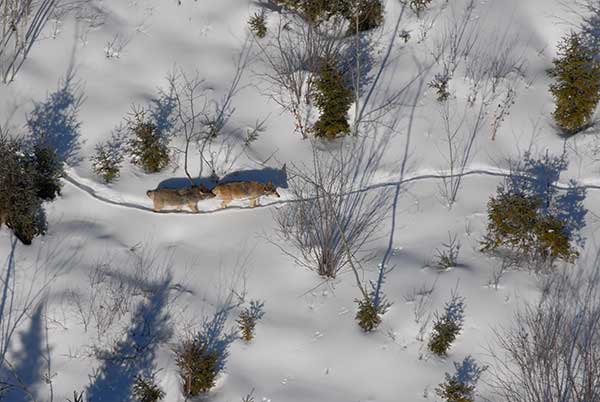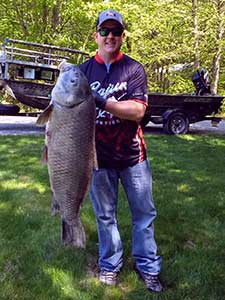- Details
MDNR Report
 Michigan Wolf Survey Shows Healthy Wolf Population in UP
Michigan Wolf Survey Shows Healthy Wolf Population in UP
Two wolves on a winter trail from a previous DNR wolf survey in the Upper Peninsula.
Michigan Department of Natural Resources Wildlife Division officials said today the states wolf population has remained relatively stable over the past four wolf surveys, the most recent of which occurred this past winter.
DNR wildlife biologists estimate there was a minimum of 662 wolves found among 139 packs across the Upper Peninsula this past winter. The 2016 minimum population estimate was 618 wolves.
Based on our latest minimum population estimate, it is clear wolf numbers in Michigan remain viable and robust, said Russ Mason, chief of the DNRs wildlife division. A similar trend is apparent in Wisconsin and Minnesota. The western Great Lakes states wolf population is thriving and has recovered.
Fifteen more wolf packs were found during this past winters survey than in 2016, but pack size has decreased slightly and now averages less than five wolves.
- Details
The Dowagiac Conservation Club will host a Hunter Safety Class July 5-7 with registration set for Wednesday at the clubhouse.
The course will be held at the club from 6 p.m. to 9 p.m. July 5-6 and 8 a.m. to 2:30 p.m. July 7.
There is no charge for the class but students must pre-register with a birth certificate and attend all three classes to get their Hunter Safety Certification.
For more information, call Furmer, 269-646-9839.
- Details
MDNR Report
The Michigan DNR announced today that a 3-year-old doe in Spring Arbor Township (Jackson County) is suspected positive for chronic wasting disease. CWD is a fatal neurological disease that affects white-tailed deer, mule deer, elk and moose.
Earlier this month, landowners in Jackson County contacted the DNR after a very ill-looking deer died on their property. DNR staff examined the deer to determine the cause of death and submitted tissue samples to Michigan State University Veterinary Diagnostic Laboratory. After initial tests were positive for CWD, samples were forwarded to the U.S. Department of Agriculture's National Veterinary Services Laboratory for confirmation. The DNR is awaiting those results.
- Details
MDNR Report
 Black Buffalo State Record Broken by Angler on Grand RiverThe Michigan DNR confirmed the catch of a new state record black buffalo on June 12.
Black Buffalo State Record Broken by Angler on Grand RiverThe Michigan DNR confirmed the catch of a new state record black buffalo on June 12.
The fish, a member of the sucker family, was caught by Brandonn Kramer of Muskegon, Mich. at 11:30 p.m. May 25 on the Grand River in Ottawa County.
Assistance was provided by Kramers friend and fishing cohort, Shawn Grawbarger, also of Muskegon. The fish weighed 46.54 pounds and measured 39.75 inches. Kramer was bowfishing when he landed the record fish.
The record was verified by Jay Wesley, a DNR fisheries manager for Lake Michigan.
The previous state record black buffalo was caught by Sage Colegrove of Muskegon on the Grand River in Ottawa County on April 12, 2015. That fish weighed 44.54 pounds and measured 38.5 inches.
State records in Michigan are recognized by weight only. To qualify for a state record, fish must exceed the current listed state record weight and identification must be verified by a DNR fisheries biologist.
For more information, visit Michigan.gov/masterangler.
- Details
MDNR Report
There are two large inland lakes in southwest Michigan, both of which are profiled in the Michigan DNR’s edition of Reel in Michigan's Fisheries.


